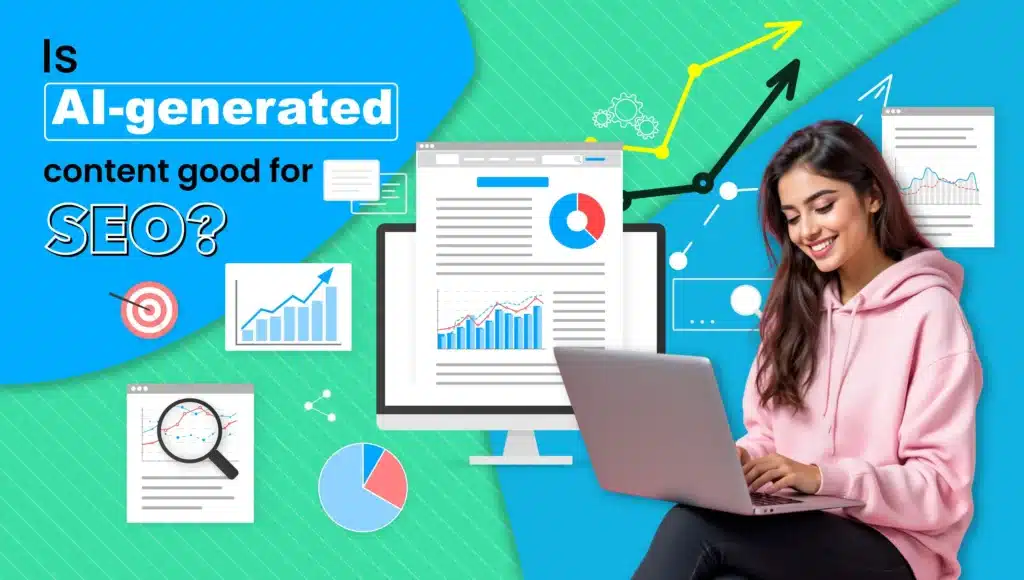AI-generated content has become a game-changer in digital marketing. With tools like ChatGPT and Jasper, content creation has become faster, cheaper, and easier. But the big question remains: is AI-generated content good for SEO?
In this article, we’ll explore the relationship between AI content and SEO. We’ll dive into how Google treats AI-generated content, whether it ranks, how it affects AdSense, and if it can be detected.
Let’s break it down with real insight, expertise, and honest evaluation.
What Is AI-Generated Content?
AI-generated content is any text, video, or image created with the help of artificial intelligence. Tools like ChatGPT, Jasper, and Writesonic can produce blog posts, product descriptions, emails, and more. These tools analyze existing data to generate human-like text.
In content marketing, AI speeds up production, improves consistency, and helps scale operations. But does faster always mean better for SEO?
Can You Use AI for SEO Content?
Absolutely. Many businesses and content marketers already do. AI tools can generate:
- Blog posts
- Product descriptions
- Meta titles and descriptions
- Social media captions
- Email copy
AI helps scale content production and reduce human workload. It also supports SEO by creating keyword-focused content quickly. However, the effectiveness depends on how it’s used.
AI + Human = Best SEO Practice
Using AI alone is not ideal. But combining AI with human editing, keyword research, and SEO strategies can drive excellent results.
For example, AI can generate a 1000-word blog post in minutes. Then a content expert can edit it for tone, brand voice, internal linking, and search intent alignment. This combination improves rankings and engagement.
Can AI-generated content rank on Google?
Yes, it can.
As of 2024, AI-generated content can rank on Google, provided it meets quality standards. Google has stated multiple times that the source of content (human or AI) does not matter. What matters is value and helpfulness.
Google’s core guidance: “We reward high-quality content, regardless of how it is produced.”
So if your AI-generated content is
- Helpful
- Relevant
- Original
- Aligned with search intent
…it can absolutely rank.
Avoid Low-Quality Spam
If your AI tool produces thin, repetitive, or misleading content, Google may ignore or even penalize it. Quality always matters.
Does Google Care If Your Content Is AI-Generated?
Not really.
Google has made it clear that it doesn’t care whether content is written by humans or AI. What it does care about is E-E-A-T (Experience, Expertise, Authoritativeness, and Trustworthiness).
Build EEAT with AI
You can still establish E-E-A-T using AI-generated content if:
- It is factually accurate
- It is backed by trustworthy sources
- It reflects your niche authority
- It helps the reader
Adding expert quotes, real-world examples, and human editing helps with trust and authority.
Does SEO Detect AI-Generated Content?
This is a common concern: can AI-generated content be detected? The short answer is yes, but it’s not that simple.
AI Detection Tools Exist
Tools like Originality.ai, GPTZero, and Copyleaks can detect AI-generated text with varying accuracy. These tools analyze patterns in grammar, sentence structure, and phrasing.
But no tool is 100% accurate. Even Google’s internal systems don’t rely solely on detection—they focus on quality signals.
Google Prioritizes Usefulness
If your content helps users and fulfills search intent, it has a strong chance of ranking—AI or not.
Is AI Content Good or Bad for SEO?
It depends on how it’s used.
When AI Content is Good for SEO
- Speeds up content creation
- Helps scale SEO campaigns
- Supports keyword integration
- Maintains topical consistency
When AI Content is Bad for SEO
- When it’s unedited or spammy
- When it lacks originality
- When it’s off-topic
- When it ignores search intent
Verdict: It’s a Tool, Not a Magic Wand
Used wisely, AI can strengthen your SEO strategy. But it’s not a replacement for SEO knowledge, user understanding, or content planning.
Does Google SEO Punish AI Content?
Google does not punish AI-generated content just because it’s AI. But it can punish low-quality content, regardless of how it’s made.
That includes content that is
- Auto-generated without value
- Spammy or keyword-stuffed
- Misleading or inaccurate
Google’s Helpful Content Update
The Helpful Content System is designed to identify content that puts humans first. If your AI content serves real people, you’re on the safe side.
So no—Google doesn’t punish AI content directly. But it will penalize anything that fails to meet its quality guidelines.
Does AdSense Approve AI Content?
Many website owners ask, Does AdSense approve AI content?
The answer is yes—but with conditions.
Requirements for AdSense Approval
- Original content
- No copyright violation
- No policy-violating AI use
- Sufficient website pages
Google’s AdSense team will check for authenticity and value. If your AI content is well-edited, informative, and properly structured, it can get approved.
Avoid Auto-Blogging Schemes
Automated blogs using unedited AI spam won’t make the cut. Google wants sites that deliver a positive user experience.
Does ChatGPT Affect SEO?
Yes, indirectly.
ChatGPT can impact your SEO workflow in several ways:
Pros
- Quick content ideation
- Streamlines writing
- Helps with SEO outlines
- Assists with meta descriptions
Cons
- May generate factual errors
- Requires editing and human oversight
- Lacks emotional nuance at times
So while ChatGPT doesn’t directly “affect SEO” in the ranking algorithm, it does affect how you produce and optimize content.
Will Google Detect AI Content?
Technically, yes—but not always accurately.
As AI gets more advanced, it becomes harder to distinguish between human and machine writing. Google’s focus has shifted from detection to impact.
Google’s Approach: Don’t Fool the Reader
If AI content is trying to manipulate rankings or deceive users, Google will respond accordingly.
But what if it provides genuine help? Detection doesn’t matter.
How Will AI Search Affect SEO?
Google’s AI-powered search (SGE—Search Generative Experience) is already reshaping the SEO landscape.
Major Changes to Expect
- Fewer organic clicks
- More direct answers
- Richer featured snippets
- AI-generated overviews
What This Means for Your Content
- Focus on long-tail keywords
- Build topical authority
- Create content clusters
- Optimize for featured snippets
AI search will reward content that answers questions clearly and quickly. So your AI-generated articles must still be designed to serve the user well.
Can AI-Generated Content Be Detected?
Yes. But detection isn’t always reliable.
AI detection tools look for signs like
- Repetitive sentence structures
- Predictable language
- Lack of personal voice
Human-Like Editing Helps
If you blend AI writing with human input—personal examples, data, and natural tone—it becomes harder to detect. More importantly, it becomes more helpful to readers.
Best Practices: How to Use AI Content for SEO
If you want to succeed, follow these guidelines:
1. Start with a Solid Outline
Define:
- Target keyword
- Subtopics
- Questions to answer
- Intent (informational, transactional, etc.)
2. Use AI to Draft, Not Publish
Let AI write your first draft. Then revise thoroughly.
- Add internal links
- Correct grammar
- Improve flow
- Insert visuals
- Cite sources
3. Monitor Performance
Use Google Search Console and Analytics to track how your AI content performs. Update regularly.
4. Mix Human Expertise
Add human perspectives, real-life experiences, or expert quotes to increase trust.
Final Thoughts
So, is AI-generated content good for SEO? The answer is yes—if it’s done the right way.
When AI helps you produce relevant, helpful, and well-optimized content, it can support and even enhance your SEO efforts. But if you rely on AI alone without editing or adding unique value, it can hurt your rankings and reputation.
The best strategy is to use AI as a powerful assistant, not a full replacement. Blend machine efficiency with human creativity and insight to create content that ranks, engages, and converts.
FAQs
Does SEO detect AI-generated content?
Yes, some SEO tools can detect AI-generated content by analyzing patterns in writing style, grammar, and repetitiveness. However, detection doesn’t always lead to penalties unless the content lacks value or relevance.
Does AI-generated content affect SEO ranking?
It can both positively and negatively affect SEO ranking. Well-edited, helpful AI content can rank well, but low-quality or spammy AI text may hurt your site’s visibility.
Does SEO penalize AI content?
SEO does not penalize content simply for being AI-generated. Penalties occur when content is manipulative, irrelevant, or low-quality, regardless of how it’s produced.
Is SEO dead due to AI?
No, SEO is not dead. In fact, AI is reshaping SEO by raising the standards for content quality. SEO is evolving, not disappearing.
Does ChatGPT-generated text hurt your SEO?
ChatGPT-generated text won’t hurt SEO if it’s edited, fact-checked, and tailored for user intent. Raw, unedited outputs, however, can harm rankings if they lack depth or clarity.
Does Google allow AI content for SEO?
Yes, Google allows AI content as long as it is helpful, original, and adheres to quality guidelines. Google prioritizes usefulness over authorship.
Does Google penalize AI-generated content in 2025?
As of 2025, Google does not penalize AI-generated content by default. Penalties apply only if the content is spammy, misleading, or of poor quality.
Is AI-generated content actually detectable?
Yes, AI-generated content is often detectable through tools and algorithms that analyze language models. However, human-edited AI content is much harder to detect and often performs better.


